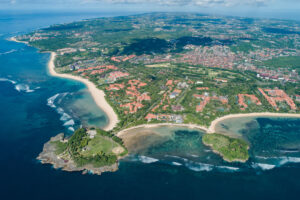Bali’s Land Conversion Moratorium: A Turning Point for Sustainable Property Investment
Bali is changing how land can be used forever , and that change could redefine opportunity for those who understand the shift.In 2025, Bali’s government imposed a moratorium banning the conversion of agricultural land into hotels, villas, and restaurants. Triggered by devastating floods and growing environmental strain, the policy marks a major shift in Bali’s development model. While some see limits, investors with foresight recognize new opportunity , from eco-friendly redevelopments to sustainable tourism ventures. The moratorium elevates the value of legally zoned land and emphasizes compliance, sustainability, and strategic insight. For BaliWide and forward-looking investors, this change isn’t a barrier , it’s a blueprint for resilient, responsible, and rewarding property growth across Bali.
Starting in 2025, the Provincial Government of Bali officially announced a moratorium on new hotels, villas, restaurants, and similar tourism enterprises built on productive land , meaning agricultural zones and environmentally critical areas.
The move follows catastrophic floods that claimed lives and destroyed infrastructure, shining a harsh spotlight on how rapid land conversion and overdevelopment have stretched Bali’s fragile ecosystems to their limits.
For property developers and investors, this isn’t just another regulation. It’s a strategic realignment , one that’s reshaping where and how opportunity lives on the Island of the Gods.
This long-form BaliWide feature breaks down what the moratorium means, how it will impact the property landscape, and , most importantly how investors can still turn this moment of restriction into one of resilience, regeneration, and profit.
Why Bali Is Drawing the Line: From Paradise to Pressure Point
Bali’s tourism and real estate boom over the last two decades has been a double-edged sword.
 On one side, it fueled local economies, created jobs, and built international demand for tropical luxury living. On the other, it also triggered unchecked land conversion, stripping away natural water-absorbing surfaces and agricultural ecosystems.
On one side, it fueled local economies, created jobs, and built international demand for tropical luxury living. On the other, it also triggered unchecked land conversion, stripping away natural water-absorbing surfaces and agricultural ecosystems.
The tipping point came with a series of devastating floods in early and mid-2025. Vast areas of Denpasar, Badung, and Gianyar were submerged. Villages in the Ayung River Basin saw their fertile lands drowned under waterlogged mud. Eighteen lives were lost.
Environmental Minister Hanif Faisol Nurofiq reported that only 1,500 hectares (3%) of the Ayung River Basin’s 49,500 hectares remain covered by forest far below the 30% minimum needed to maintain ecological balance. With barely any forest canopy to absorb rainfall, water simply rushes down the slopes into the lowlands carrying topsoil, silt, and property damage in its wake.
Governor Wayan Koster, recognizing the scale of destruction, declared:
“Starting in 2025, there will be no more conversion of productive land for commercial purposes. This includes hotels, restaurants, and villas. Bali must protect its rivers, soil, and ecosystem for future generations.”
It was a powerful statement but more than that, it was a line in the sand.
The moratorium is part of Bali’s 100-Year Vision, aiming to reorient growth toward sustainability, cultural integrity, and environmental balance.
In short: Bali isn’t anti-development. It’s anti-overdevelopment.
What the Moratorium Covers: Understanding the Boundaries
At its core, the new regulation restricts new construction on “productive land” land classified for agriculture, water absorption, or other ecological functions.
What’s included under the moratorium:
- Hotels, villas, restaurants, beach clubs, and any tourism-related facilities on productive land.
- Any land-use conversion from agricultural to commercial zoning without government approval.
- Expansions of existing facilities that spill into protected or green zones.
What is not automatically banned:
- Developments on already-zoned tourism or mixed-use land.
- Renovations, restorations, or expansions within existing legal boundaries.
- Private residences built by individuals (if not for commercial use).
In simpler terms: you can still build , but only where it’s legally meant to happen.
That distinction creates a market shift where compliant zoning becomes the new currency of value.
The Zoning Landscape: Where the Pressure Is Felt Most
The moratorium will be applied selectively but strategically. Based on current government discussions, enforcement will roll out across six regencies in late 2025:
| Regency | Primary Land Type | Projected Impact |
|---|---|---|
| Tabanan | Agricultural rice fields, high rainfall zones | Very High |
| Buleleng | Forested & coastal | Moderate |
| Jembrana | Agricultural & rural | Moderate |
| Bangli | Highland catchment areas | High |
| Karangasem | Arid coastal & rural | Moderate |
| Klungkung | Small coastal & island zones | High (especially Nusa Penida) |
Denpasar, Badung, and Gianyar Bali’s tourism core may see partial exemptions or transition rules, as these areas are already largely zoned for tourism.
However, the policy still impacts these regencies indirectly: permits will be stricter, enforcement will be tighter, and “grey zone” building will face scrutiny.
A Shock to the System: The Property Market Reacts
The announcement immediately sent ripples through Bali’s real estate market.
Developers who had been buying agricultural land cheaply, expecting to convert it later, suddenly found themselves holding non-developable assets.
Property agents reported a surge in inquiries about zoning legality and title verification. Investors began shifting interest toward brownfield redevelopment , upgrading existing hotels or villas rather than starting from scratch.
Interestingly, land prices in already-zoned tourism areas such as Canggu, Pererenan, Uluwatu, and Sanur began to climb. Legal clarity became a premium asset.
Meanwhile, “green” or “productive” plots without permits saw price stagnation even as owners tried to offload them quickly before the moratorium’s enforcement date.
This marks a new chapter in Bali’s property cycle: from speculation to sophistication.
Investor Outlook: Constraints That Create Opportunity
While some see the moratorium as a constraint, smart investors recognize what it truly represents — a filtering mechanism.
Bali is signaling that only sustainable, legally compliant, and environmentally conscious projects will be welcomed moving forward. That clarity creates a long-term investment framework that rewards credibility over opportunism.
For investors, this means:
A. Higher barriers to entry but stronger long-term returns.
Fewer projects will be approved, meaning supply will tighten. Over time, this scarcity drives up value for compliant developments.
B. Shift from greenfield to brownfield investment.
Instead of building on farmland, investors will focus on redeveloping existing assets, refurbishing old hotels, or repositioning underutilized villas.
C. Rise of eco-tourism and regenerative development.
Projects integrating sustainability solar power, greywater systems, agro-tourism, or permaculture — will align with Bali’s new policy and attract both government approval and high-value guests.
D. Enhanced trust in legal agencies.
As confusion rises, clients will turn to knowledgeable brokers like BaliWide who can navigate zoning maps, permits, and compliance confidently.
In short, the new era favors educated investors, not speculative flippers.
How BaliWide Can Lead the New Market Shift
For an advocacy-driven company like BaliWide, the moratorium isn’t a setback it’s a strategic opening.
Here’s how to position for leadership in this evolving landscape:
- Zoning Verification Services , Offer clients pre-purchase zoning checks, including classification reports and legal documentation assistance.
- Redevelopment Opportunities , Focus listings on existing properties ready for eco-upgrades or adaptive reuse.
- Sustainability Partnerships , Collaborate with eco-designers, landscape architects, and environmental consultants to create compliant projects.
- Data-Driven Market Insight , Publish quarterly updates on regulatory trends, zoning shifts, and new Perda enactments.
- Investor Education , Use blogs, social media, and newsletters to simplify what “productive land” means and how it affects value.
- Long-Term Vision Branding , Align BaliWide’s identity with sustainability, trust, and the tagline: Turning Opportunity Into Reality.
The Environmental Rationale: From Flood to Future
At its heart, the moratorium is not anti-tourism. It’s pro-survival.
Over the last decade, Bali has lost over 450 hectares of forest cover, weakening its natural ability to absorb rainfall. Combined with rapid urbanization and poorly managed drainage, flooding became inevitable.
The new policy seeks to rebalance the island’s hydrological cycle by stopping land conversion and protecting absorption zones.
This move echoes global trends , from Thailand’s eco-zoning reforms to Costa Rica’s forest protection laws , where tourism and nature are no longer viewed as adversaries but as partners.
By 2030, Bali aims to achieve carbon-neutral tourism and 40% renewable energy integration. The moratorium is a structural step toward that vision.
For developers, the message is simple: Profit must flow with nature, not against it.
The Legal Framework and Enforcement
While the moratorium is a provincial initiative, its execution depends on coordination between the Governor’s Office, regencies (Bupati/Mayors), and national ministries.
Key mechanisms include:
- KLHS (Strategic Environmental Assessment) reviews for all spatial planning zones.
- Updated RTRW (Regional Spatial Plans) that will redefine productive vs. non-productive boundaries.
- Revised permit procedures under Dinas Penanaman Modal dan Pelayanan Terpadu Satu Pintu (DPMPTSP).
- Public monitoring of land-use violations through digital reporting.
It’s expected that new Perda (Regional Regulations) will be issued by mid-2026, formalizing the moratorium’s long-term structure.
The Human Factor: Farmers, Villages, and Local Economy
Beyond the investors, Bali’s villages are at the center of this transformation.
Many farmers, enticed by high land prices, sold rice fields to developers over the years leading to reduced agricultural output and rising food imports.
By halting land conversion, the government hopes to revitalize agriculture and stabilize local food systems.
At the same time, this shift encourages community-based tourism: homestays, agro-tourism, and cooperatives that keep land productive while generating income.
For BaliWide and its network, partnering with such community-driven initiatives could unlock authentic and ethical investment opportunities that align with both policy and profit.
Strategic Opportunities Ahead
As the dust settles, these are the market pathways emerging in Bali’s new era:
| Strategy | Description | Investment Potential |
|---|---|---|
| Brownfield Redevelopment | Upgrade old hotels, villas, and lodges | High |
| Agro-Tourism Ventures | Merge farming with tourism experiences | Moderate-High |
| Eco-Retreats in Legal Zones | Build small, sustainable lodges within tourism zones | High |
| Residential Eco-Clusters | Private villas or co-living under eco standards | High |
| Joint Ventures with Villages | Lease agreements on community land | Moderate |
| Reforestation + CSR Partnerships | Eco branding through land restoration | Indirect ROI but strong brand value |
Global Parallels: Lessons from Other Destinations
Bali’s moratorium isn’t unique — and its lessons echo globally.
- Thailand (Chiang Mai) banned new hotels in Old Town to preserve cultural integrity.
- Costa Rica introduced strict land-use laws that transformed it into a world eco-tourism leader.
- Hawaii implemented limits on short-term rentals to rebalance local housing access.
- Santorini, Greece restricted construction to maintain landscape identity.
Each destination initially faced backlash but later saw property appreciation in compliant areas and a shift toward quality over quantity.
Bali is following the same trajectory.
Challenges & Potential Pitfalls
No major transition comes without turbulence.
Key risks include:
- Uneven enforcement between regencies.
- Legal disputes over pre-existing land rights.
- Potential corruption or loopholes in zoning interpretation.
- Investor confusion slowing down transactions.
- Speculative misinformation from parties trying to manipulate land prices.
This is where professional guidance and transparency will separate successful agencies from those that fade away.
Turning Policy Into Opportunity
For forward-thinking investors, this moratorium isn’t the end of Bali’s real estate story it’s the beginning of a more refined chapter.
BaliWide’s mission Turning Opportunity Into Reality now means more than ever:
Guiding investors to sustainable, compliant, and meaningful developments that thrive under the new paradigm.
Opportunity is not gone. It has evolved.
And those who evolve with it will lead Bali’s next era of prosperity.





